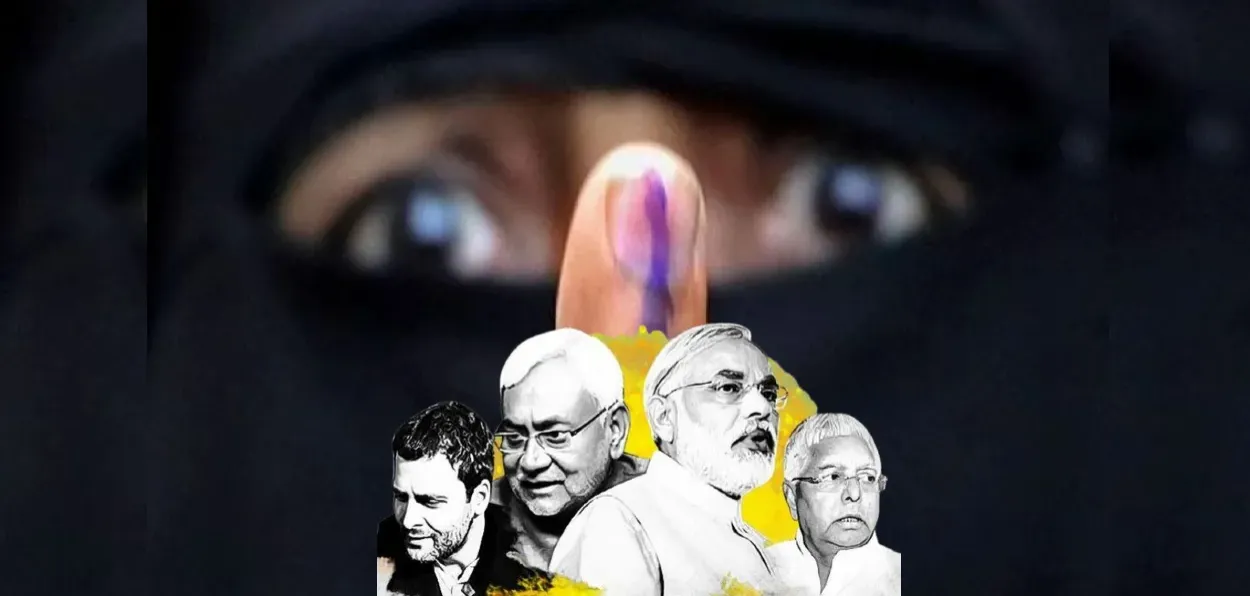
New Delhi
As the momentum for Bihar Assembly elections picks up, a debate has been triggered off within the community that constitutes about 18 percent of the State's population about its role and relevance in politics.
Are the political parties like the NDA, the RJD and others treating the Muslims appropriately in the distribution of tickets? Have Muslims become irrelevant to the politics of one of the largest states of India?
This is happening when there are 53 seats on which the Muslim vote can prove decisive in the election result.
Although no political party has fielded candidates from Muslims in proportion to their population, this community can play a decisive role in about 53 of the 243 seats in the state.
These seats are mostly spread across seven districts: Katihar, Kishanganj, Araria, Purnea, Darbhanga, Sitamarhi and East Champaran.
According to the 2011 census, Kishanganj has the highest Muslim population at 68 percent. Four representatives will be elected to the assembly from here.
Katihar is at the top with a Muslim population of 62 percent, and seven MLAs will be elected from here.
Araria has a Muslim population of 41 percent, and six MLAs will be elected from here.
Purnea has a Muslim population of 37 percent, and it includes seven assembly constituencies.
Darbhanga has ten assembly seats, and its population is 23 percent Muslim. East Champaran has 22 percent and Sitamarhi has 21 percent Muslim population and it has twelve and seven seats.
This time, in the Bihar assembly elections, various political parties have fielded only 35 Muslim candidates. The RJD and the Congress, the two major allies of the India Bloc, which call themselves the well-wishers of Muslims, have given tickets to only 28 Muslim candidates.
On the NDA side, Chief Minister Nitish Kumar's JD(U) has given tickets to only 4 Muslim candidates out of 101 seats this time. The Lok Janshakti Party (Ram Vilas), led by Chirag Paswan, which is contesting on 29 seats, has given tickets to one Muslim candidate.
In the 2020 Bihar Assembly elections, the ruling JDU fielded 11 Muslim candidates; none won. The BJP did not give tickets to any Muslim leader. The RJD fielded 144 candidates, of which 17 were Muslim candidates. Of these, 8 won. The Congress fielded 12 Muslims out of 70, of whom 4 won. The CPI(M) and the BSP fielded one Muslim candidate each and both won.
The Asaduddin Owaisi-led AIMIM fielded 16 candidates, of whom 5 were successful, and, later, 4 of them joined the RJD.
Between 1990 and 2020, Muslim representation in the Bihar Assembly averaged around 8%. The 2020 Assembly had 19 Muslim MLAs, or 7.81% of the 243-member House. In 2015, Muslim representation reached 24, or 9.87%, one of their highest ever. In subsequent elections, Muslim representation declined due to changes in party nominations and political alliances.
The BJP and its policy on the representation of Muslims are clear to everyone. The party does not have any Muslim members in both the Lok Sabha and the Rajya Sabha. But JDU has surprised political analysts this time. Although Nitish Kumar has lost a large part of the Muslims by joining hands with the BJP, it was expected that he would give adequate representation to the minority community. However, he has disappointed his supporters. The Tejashwi Yadav-led RJD has always raised its voice against communalism and has had close ties with Muslims.
Muslims have supported this party in almost every election. According to the Bihar Caste Survey 2022, the population of the Yadav community in the state is about 14.26 per cent or 18.65 million. Despite having a share of less than 15 per cent.
ALSO READ: Minhaj’s mission is to empower Ranchi’s slum children
However, analysts say that parties are focused on winning and not on the religion of the candidates. Besides, the Muslims too have to actively participate in different parties and grow in stature there, staking claim to join electoral politics.
